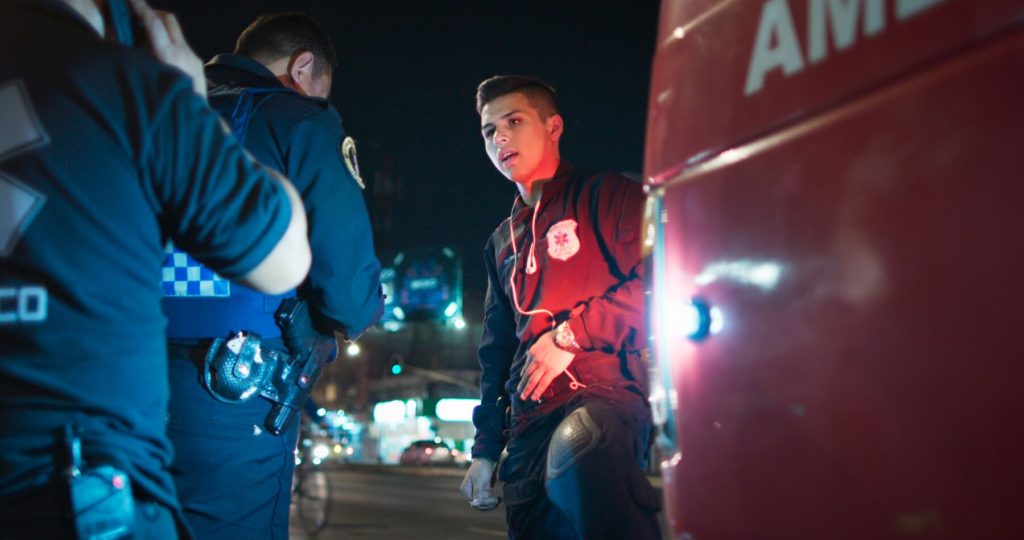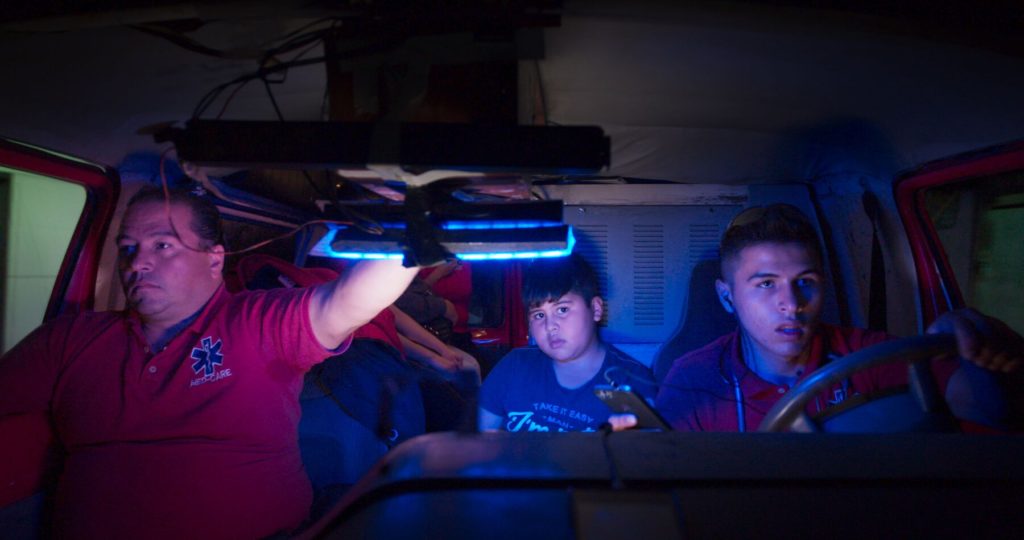
In his gripping documentary Midnight Family, filmmaker Luke Lorentzen takes us on ridealongs with an all-night ambulance crew in Mexico City. It’s even wilder than you may expect.
Midnight Family is set in an absurd situation with life-and-death stakes. We learn right away that there are only 45 government-operated ambulances in Mexico City, a metropolis of 9 million. The rest of the ambulances are private and mostly independents.
Competition is cut throat. The private ambulances listen to police scanners and then TRY TO OUTRACE each other to the scene. One of these independent ambulances is the Ochoa family’s business.
Fernando Ochoa is the head of the family, and he collects the ambulance fee from hospitals and patients. His 17-year-old son Juan is the voluble front man and driver, who careens them through the Mexico City streets at alarming speed. The Ochoa’s colleague, the even-tempered medic Manuel, rides in the back. The youngest Ochoa son, pudgy, Ruffles-devouring 10-year-old Josue, rides along as a gopher. BTW there are no seat belts in the back.
The private ambulances operate in a shady world of semi-formal licensing, so they can always be shut down arbitrarily by the cops. Indeed, we even see the Ochoas arrested while trying to take a patient to the hospital. It’s common for the police to extract bribes from the vulnerable ambulance crews.
There is an incentive to steer patients to the private hospitals that will pay the ambulance crews, so their business is, by its nature, often a hustle; there are some instances of ethical ambiguity. Aiming to depict a “wide spectrum”, Lorentzen balances life-saving heroics with the more sketchy moments. Getting payment out of a grieving family when the loved one dies on the way to the hospital is, well, awkward.
Here is the Ochoa’s business model. Ideally, they get paid about $250 to deliver a patient to a private hospital. They deduct the cost of gasoline, medical supplies and police bribes, and then split what’s left four ways. If a patient can’t or won’t pay, if the vehicle breaks down, or if the cops shut them down – the Ochoas are out of luck.

Fernando is silent but expressive. Carrying an alarming belly, he stoically juggles an assortment pills to treat his chronic illness. The loquacious Juan is a born front man, and basically provides play-by-play commentary throughout the film in real time. We see him downloading the previous night’s drama over the phone to his girlfrend Jessica and, by loud speaker, directing other Mexico City drivers out of his way.
Fernando and Juan sleep on the floor of a downscale apartment, and they never know if they’ll make enough money for tomorrow’s gasoline. It’s an incredibly stressful existence. How resilient can they be? Is there any limit to the stress they can absorb? As Lorentzen himself says, this is “a world where no one is getting what they need”.
I saw Midnight Family at the 2019 San Francisco International Film Festival (SFFILM), which included an in-person Q&A with Lorenzen. Lorentzen spent 80-90 nights with the crew. About 70% of the film comes from the last three nights that he rode with the Ochoas.
Midnight Family joins a mini-genre of rogue ambulance cinema. The very dark Argentine narrative Carancho stars the great Ricardo Darin as a LITERALLY ambulance-chasing lawyer. In the Hungarian dark comedy Heavenly Shift (I saw it at the 2014 Cinequest), an outlaw ambulance crew gets kickbacks from a shady funeral director if the patient dies en route to the hospital.
Midnight Family is just concluding a run at the Roxie in San Francisco. I’ll let you know when it’s streamable. Midnight Family is one of the nest documentaries of the year, and on my Best Movies of 2019.
